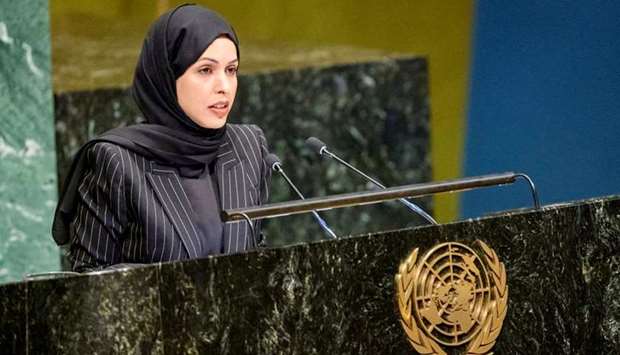The State of Qatar has urged the UN Security Council to take decisive action to deter those responsible for the military escalation in western Libya and warned against further slide into chaos and insecurity in western Libya.
This came in a statement delivered by HE ambassador Sheikha Alya Ahmed bin Saif al-Thani, Permanent Representative of the State of Qatar to the United Nations, at the regular meeting of the UN Security Council on “The situation in the Middle East, including the Palestinian question”.
HE Sheikha Alya expressed Qatar’s deep concern at the military escalation in western Libya, and said “The State of Qatar is following with great concern the military escalation in western Libya that preceded the convening of the Libyan National Congress, which threatens to undermine the path of the political solution sponsored by the United Nations.”
“The State of Qatar warns of sliding back into chaos and insecurity in western Libya, which will have serious repercussions on the political track and the ability of institutions in those areas to protect citizens and run their affairs on one hand, and to contain the problem of illegal immigration and human trafficking on the other,” she added.
She noted that the critical situation in Libya as a result of the dangerous escalation and the attack on Tripoli, and its reflection on the unity of Libya and the future of the political solution, required the Security Council to take decisive action to deter those responsible for the escalation and to implement Security Council resolutions.
HE Sheikha Alya also expressed the full support of the State of Qatar to the legitimate and internationally recognised Government of National Reconciliation in accordance with Security Council resolutions and to the efforts of the UN envoy Ghassan Salame, to reach a just political solution for the Libyan people.
With regard to the unjust blockade on the State of Qatar, she reiterated that the blockade imposed on the State of Qatar nearly two years ago constitutes a flagrant violation of the Charter of the United Nations and the principles of friendly relations between States, which obliges States to refrain from fuelling conflicts and resolving disputes through dialogue and peaceful means.
“In light of the tensions in our region, this fabricated, open-ended crisis not only harms the State of Qatar and the region of the world’s vital Gulf, but also creates a dangerous precedent in international relations by legitimising illegal actions and human rights violations,” and undermines the efforts of the Security Council in maintaining international peace and security,” she said.
HE Sheikha Alya said: “The Gulf crisis has demonstrated the soundness of the legal position of the State of Qatar, represented by an order issued by the International Court of Justice in July 2018, which clearly demonstrated the keenness of the State of Qatar to resort to mechanisms provided by international law to settle disputes.”
She added that the nearly two years of the blockade and the unjust campaign against the State of Qatar had revealed the status of the State of Qatar at the international level and its valuable contribution in enhancing international co-operation in respect of international law and maintaining international peace and security, stressing that the State of Qatar will continue this approach, which is appreciated by the United Nations and the world, and reflects its international partnerships in the face of common challenges.
Sheikha Alya reiterated Qatar’s support and appreciation for the sincere mediation of the Amir of the State of Kuwait Sheikh Sabah al-Ahmad al-Jaber al-Sabah, and expressed the appreciation of the State of Qatar for the friendly countries that supported mediation.
With regard to the Palestinian issue, Sheikha Alya reiterated that the Palestinian issue is the biggest challenge, stressing that a just, comprehensive and sustainable solution to the Middle East issue is the two-state solution, Palestine and Israel, and called for the establishment of an independent Palestinian state based on the 1967 borders with East Jerusalem as its capital, in accordance with the relevant Security Council resolutions, the Arab Peace Initiative and the end of the Israeli occupation of the occupied Arab territories, including the Syrian Golan and the occupied Lebanese territories.
She also reiterated the State of Qatar’s firm position of principle that the Golan Heights are occupied Arab land and that Israel’s imposition of its laws, jurisdiction and administration on the Golan was null and void and without any legal effect.
Sheikha Alya also expressed the State of Qatar’s rejection of any attempts to undermine the status of the city of Jerusalem, especially the Al-Aqsa Mosque, which is facing constant attempts to break into by the Israeli occupation forces. “This is a clear violation of international agreements and legitimacy,” she said.
Sheikha Alya said the State of Qatar, in co-ordination with the United Nations and the parties concerned, continues to work towards calm and to provide an environment conducive to the prospects for advancing the peace process and alleviating the humanitarian situation of the Palestinians, especially in the Gaza Strip.
In this context, she referred to the directives of His Highness the Amir Sheikh Tamim bin Hamad al-Thani, for urgent assistance worth $150mn to address the difficult humanitarian situation.
She also noted the Qatari assistance which contributed to securing the fuel needed to generate electricity in the Gaza Strip during the past period, pointing also to the support and projects that have been implemented over the past years.

HE Sheikha Alya Ahmed bin Saif al-Thani
